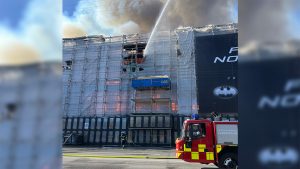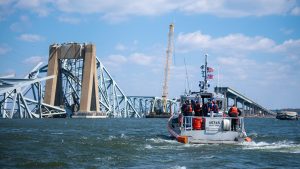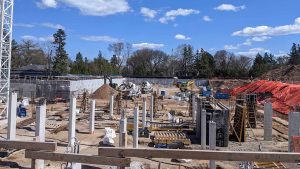Every year, the Independent Contractors and Businesses Association presents the CEO Breakfast at Buildex Vancouver. This year’s speakers were B.C Minister of Natural Gas Development, Rich Coleman, and Business COuncil of British Columbia economist Jock Finlayson.
Every year, the Independent Contractors and Businesses Association presents the CEO Breakfast at Buildex Vancouver.
This year's speakers were B.C. Deputy Premier and the Minister of Natural Gas Development and Minister Responsible for Housing, Rich Coleman, and Business Council of British Columbia economist Jock Finlayson.
Coleman began by saying the province has recently presented a balanced budget and that British Columbia is where the world wants to invest.
“We have a generational opportunity in front of us,” Coleman said about the natural gas reserves in BC. He added there is an opportunity to send natural gas to Asia, which would mean half a billion dollars in royalties alone.
Coleman said the government can handle the fundamentals of an Liquified Natural Gas (LNG) industry, and that every ministry is focused on creating that industry.
But, there is a labour challenge that has to be met, Coleman said.
With shipbuilding, smaller gas plants and work across western Canada, the labour issue is driving the price of workers up.
Investors have seen the same problem happen elsewhere and will not invest in B.C. if they have to deal with such issues again.
So, it’s vital, Coleman said, that the construction industry can supply the needed labour to build LNG.
Coleman said the government is building a matrix to determine what jobs are needed and how many workers are available, including projecting ahead to see how many graduates will be available in future to enter the industry.
British Columbians and Canadians will get first crack at jobs, but immigration is also key, Coleman said.
B.C. is building a statistical base to determine how much labour is available, he said, but the government needs the participation of construction companies to do so.
Economist Jock Finlayson from the Business Council of British Columbia also addressed the 17th Annual CEO Breakfast at Buildex Vancouver.
“At the B.C. Business Council we’re excited about the LNG Model,” he said, “but that’s not what he is going to be discussing today.”
Finlayson talked about the recovering global economy and then delved down into Canada.
Finlayson noted that the contents of the budgets yesterday haven't cause him to revise his forecasts, as they were “hold the line” budgets.
The underlying pace of economic growth in the U.S. is accelerating and Eurozone has emerged from recession, although, he noted, that growth remains anemic in a number of places.
The Canadian, U.S. and German economies are bigger than they were before the recession, but many others are smaller and Greece’s economy is about one fifth of the size.
“The global outlook is better,” he said. “It’s not a boom, but it’s an improvement on what we’ve seen.”
From a short term perspective, keep an eye on the U.S., he said.
“I think finally the U.S. economy is going to catch the wave and see some growth,” he said.
Consumer confidence is rising and profits are at an all-time high, he added.
Government fiscal drag is diminishing, as the austerity period winds down. The Federal Reserve is pulling back from quantitative easing but this has eased up.
The Canadian job market has bounced back fully, and while the U.S. has recovered it hasn’t yet come back to full recovery of the job level before the financial crisis of 2008.
The U.S. still has the world’s biggest economy, a younger population, the world’s best universities and competitiveness at a level not seen in Canada.
Canada has outperformed other economies in terms of GDP growth, Finlayson said. But, unlike the U.S. economy, our economy is quite unbalanced. The consumer does not have the spending power to drive the economy and net exports and business investment will have to be the new engine of growth.
The overall forecast for Canada is good, but 2013 was a sluggish year for B.C.
Domestic demand was hindered by government fiscal drag, stretched consumer finances, soft retail sales and lover business investment.
But, things will improve this year and next, Finlayson said, and construction investment and LNG will be big drivers for the economy over the medium term.
Job growth in construction has outpaced the B.C. economy in a big way, and is still a growth engine.
B.C. exports posted a seven per cent increase last year, a much better result than the rest of Canada.
Resources still dominate B.C.’s export mix, but if LNG ramps up, exports will gain even more importance, Finlayson said.
We need to build up LNG because the U.S. market will be self-sustaining by 2025. We need to find outside markets such as Asia, he said, or the industry will “wither and die.”
Non-residential construction remains volatile, but there is robust project investment activity, with $83 billion in projects that are already underway and another $150 billion in proposed projects.
The shift back to PST eroded competitiveness, and a carbon tax has resulted in very high fuel prices, Growing “social license” issues are also emerging that may hamper industrial activity.
Skill shortages are also a factor, as is dysfunctionality of municipal governments.
The bottom line is that Canada’s economy should pick up over 2014-15, and while B.C. has lagged, it is expected to pick up.
B.C. has diversified trading partners, access to Asia, and a big LNG opportunity.
JOC DIGITAL MEDIA










Recent Comments
comments for this post are closed